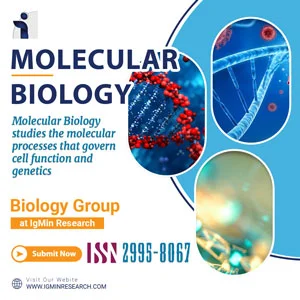Open Access Policy refers to a set of principles and guidelines aimed at providing unrestricted access to scholarly research and literature. It promotes the free availability and unrestricted use of research outputs, enabling researchers, students, and the general public to access, read, download, and distribute scholarly articles without financial or legal barriers. In this response, I will provide you with an overview of the history and latest resolutions related to Open Access Policy.
About
Publish Your Breakthroughs in Molecular Biology
Are you looking to submit a molecular biology manuscript and share your discoveries with a global scientific audience? Welcome to our platform, where innovation meets opportunity in the dynamic field of molecular biology research publishing.
Why Publish with Us?
Our molecular biology open-access journals provide an inclusive and rigorous platform for researchers, scholars, and professionals dedicated to advancing knowledge in DNA, RNA, gene expression, cell signaling, genomics, proteomics, and more.
Publishing in our journals offers:
- Fast, transparent peer review
- Global visibility through open-access
- Compliance with international ethical standards
- Indexing in leading databases
Trusted by Scientists Worldwide
We understand the importance of publishing in journals with credibility. Our journals maintain a competitive molecular biology journal impact factor, reflecting both the quality and influence of the research we publish.
Whether you're an emerging scientist or an established researcher, your work deserves to reach the right audience. Our editorial team is committed to guiding you throughout the molecular biology journal submission process to ensure a smooth and efficient experience.
Submit Your Manuscript Today
Get started with our user-friendly submission system. Upload your article, track its progress, and join thousands of authors advancing science through molecular biology research publishing.
???? Ready to share your work with the world?
Submit your molecular biology manuscript today and contribute to the next wave of scientific breakthroughs.
Editors
Biology Group (7)
Open Access Policy refers to a set of principles and guidelines aimed at providing unrestricted access to scholarly research and literature. It promotes the free availability and unrestricted use of research outputs, enabling researchers, students, and the general public to access, read, download, and distribute scholarly articles without financial or legal barriers. In this response, I will provide you with an overview of the history and latest resolutions related to Open Access Policy.
Open Access Policy refers to a set of principles and guidelines aimed at providing unrestricted access to scholarly research and literature. It promotes the free availability and unrestricted use of research outputs, enabling researchers, students, and the general public to access, read, download, and distribute scholarly articles without financial or legal barriers. In this response, I will provide you with an overview of the history and latest resolutions related to Open Access Policy.
Open Access Policy refers to a set of principles and guidelines aimed at providing unrestricted access to scholarly research and literature. It promotes the free availability and unrestricted use of research outputs, enabling researchers, students, and the general public to access, read, download, and distribute scholarly articles without financial or legal barriers. In this response, I will provide you with an overview of the history and latest resolutions related to Open Access Policy.
Open Access Policy refers to a set of principles and guidelines aimed at providing unrestricted access to scholarly research and literature. It promotes the free availability and unrestricted use of research outputs, enabling researchers, students, and the general public to access, read, download, and distribute scholarly articles without financial or legal barriers. In this response, I will provide you with an overview of the history and latest resolutions related to Open Access Policy.
Open Access Policy refers to a set of principles and guidelines aimed at providing unrestricted access to scholarly research and literature. It promotes the free availability and unrestricted use of research outputs, enabling researchers, students, and the general public to access, read, download, and distribute scholarly articles without financial or legal barriers. In this response, I will provide you with an overview of the history and latest resolutions related to Open Access Policy.
Open Access Policy refers to a set of principles and guidelines aimed at providing unrestricted access to scholarly research and literature. It promotes the free availability and unrestricted use of research outputs, enabling researchers, students, and the general public to access, read, download, and distribute scholarly articles without financial or legal barriers. In this response, I will provide you with an overview of the history and latest resolutions related to Open Access Policy.
General Science Group (1)
Open Access Policy refers to a set of principles and guidelines aimed at providing unrestricted access to scholarly research and literature. It promotes the free availability and unrestricted use of research outputs, enabling researchers, students, and the general public to access, read, download, and distribute scholarly articles without financial or legal barriers. In this response, I will provide you with an overview of the history and latest resolutions related to Open Access Policy.

Why publish with us?
Global Visibility – Indexed in major databases
Fast Peer Review – Decision within 14–21 days
Open Access – Maximize readership and citation
Multidisciplinary Scope – Biology, Medicine and Engineering
Editorial Board Excellence – Global experts involved
University Library Indexing – Via OCLC
Permanent Archiving – CrossRef DOI
APC – Affordable APCs with discounts
Citation – High Citation Potential
Which articles are now trending?
Research Articles
- Application of Virtual Reality (VR) in Facility Management Competency-based Training (CBT) in the Era of Industrie 5.0
- Detection of Adenoviruses and Astroviruses in Patients and Marine Animals in the Republic of Guinea
- Evaluating Digital Imaging Technologies for Anogenital Injury Documentation in Sexual Assault Cases
- Methodology of the Professional-Business Game for the Development of a Cadet Leader in Professional Training Courses (L-1B) of the Tactical Level of Military Education
- The Impact of Stress on Periodontal Health: A Biomarker-Based Review of Current Evidence
- Balancing Act: Exploring the Interplay Between Human Judgment and Artificial Intelligence in Problem-solving, Creativity, and Decision-making
Advertisement

































